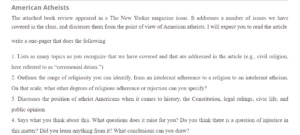American Atheists
Lists as many topics as you recognize that we have covered and that are addressed in the article (e.g., civil religion, here referred to as “ceremonial deism.”)
- The US historical background– Daniel Seeger was an American who wanted to commit himself to the military but had no religious stand. Religion played a greater role in the definition of the roles of military men in the nineteen fifties.
- American civil religion– during World War II, people with strict religion were denied the chance to become commanding officers (CO) for fear that they would not do what was required to win the war. However, atheists had the least chance. As a result, Seeger presented his case to the Supreme Court in 1965, having applied to become a CO and declined (Casey, 2). The court ruled in his favor, but to date, atheists have little in running greater offices in the US.
- A Christian nation– American colonizers brought the notion of religious diversity only based on Christianity. Thus, any person who had no religion was deemed an irresponsible citizen. John Locke initiated the idea of Christianity, leading to many non-believers, such as Roger Williams, being banned for spreading their diverse opinions.
- The Founders and the Constitution– According to Article VI, signed in 1787 Constitutional Convention banned religious tests for officeholders (Casey 4).
Outlines the range of religiosity you can identify, from an intolerant adherence to a religion to an intolerant atheism. On that scale, what other degrees of religious adherence or rejection can you specify?
According to religious history, America has remained a religious country over the years due to colonization by Christianity. Nevertheless, many activists have come out to support their need for recognition as non-believers and atheists. Their protests were faced with resistance from the Christians, and as a result, many suffered during the historical error as they became associated with negative acts and even terrorism (Casey 4). Christians found the need to support their religion even at the office level leading to blasphemy laws, which are still present in some of the states such as Michigan, Oklahoma, South Carolina, Massachusetts, and Wyoming.
Even with pioneers such as Daniel Seegers, atheists still faced a challenge in acquiring recognition among the American people. As a result, some of the major players in the protest, like Thomas Paine, died as outcasts as they supported resistance to religion. Over time, atheists are becoming accepted within the community even though they face lots of stigma and radicalization. Some people prefer gay people and Muslims compared to atheists. Due to the godless Constitution of 1953, greater support and strength were added to the fight against atheism, which led to legislators championing Christianity even within the House of Representatives.
Discusses the position of atheist Americans when it comes to history, the Constitution, legal rulings, civic life, and public opinion.
Atheist Americans experience a challenge as it is not an accepted religion. Various laws have been developed to fight for their freedom of worship. Several protestors and supporters of non-believers have come forward to try and support atheism with failure. Socially, they are viewed as people who lack belief and moral guidance. Throughout the history of the American people, they have faced prejudice and rejection even in government offices. To date, some states still remain reluctant to accept atheists as community members. Their civil rights are limited as they are unable to present their cases in court. A Jewish man presented a case to the Pennsylvania Supreme Court, but the case was overruled as the judge insisted a case against Christianity is a case against the civil government (Casey 6). Atheists were not allowed to stand as witnesses in the court of law since they lacked the fear attributed to the Supreme Being. Many have been prosecuted and banished for fighting and protesting against Christianity in the US.
Says what you think about this. What questions does it raise for you? Do you think there is a question of injustice in this matter? Did you learn anything from it? What conclusions can you draw?
Atheists are people who do not believe in a higher being but instead believe in their instincts and immediate environment. Even though no proof has ever been submitted to prove the existence of God, many Americans believe that a Christian is a moral and responsible citizen. The fight for atheist rights continues, but they face discrimination in work and social life. As a Christian, it is good to base your beliefs on the supernatural and the existence of God. Through belief, we have principles that provide guidelines for our daily living.
Works Cited
Casey Cep. “Why Are Americans Still Uncomfortable with Atheism?” Newyorker.com, 29 Oct. 2018, www.newyorker.com/magazine/2018/10/29/why-are-americans-still-uncomfortable-with-atheism.
ORDER A PLAGIARISM-FREE PAPER HERE
We’ll write everything from scratch
Question
American Atheists
The attached book review appeared in a The New Yorker magazine issue. It addresses a number of issues we have covered in the class, and discusses them from the point of view of American atheists. I will expect you to read the article

American Atheists
write a one-pager that does the following
- Lists as many topics as you recognize that we have covered and that are addressed in the article (e.g., civil religion, here referred to as “ceremonial deism.”)
- Outlines the range of religiosity you can identify, from an intolerant adherence to a religion to an intolerant atheism. On that scale, what other degrees of religious adherence or rejection can you specify?
- Discusses the position of atheist Americans when it comes to history, the Constitution, legal rulings, civic life, and public opinion.
- Says what you think about this. What questions does it raise for you? Do you think there is a question of injustice in this matter? Did you learn anything from it? What conclusions can you draw?
Article:

